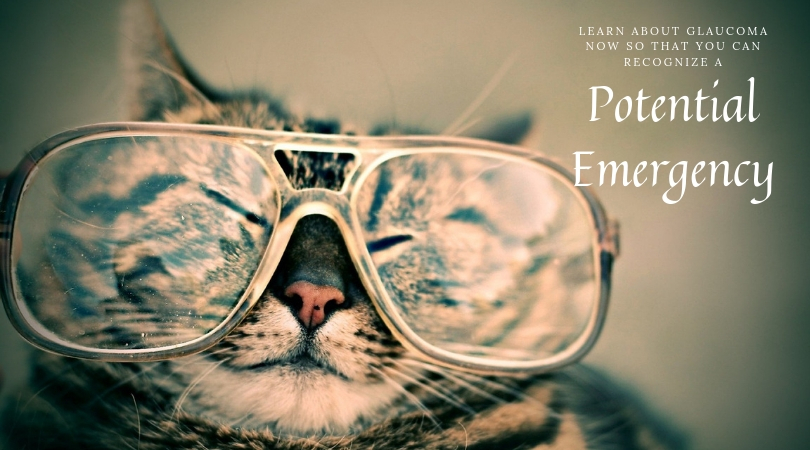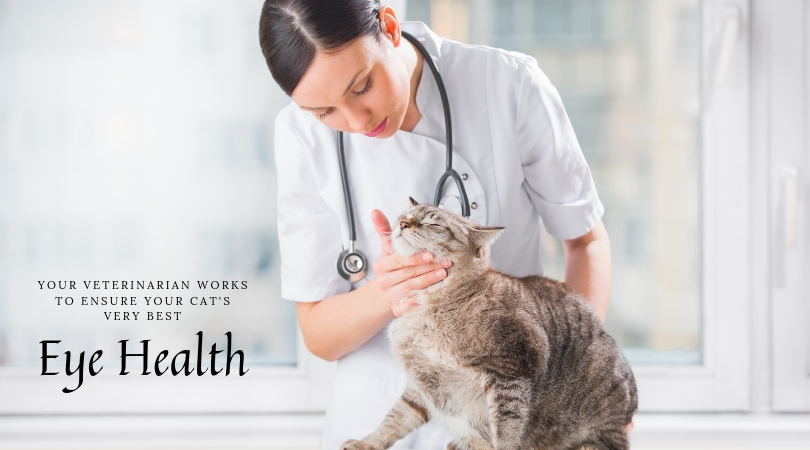Glaucoma is rare in cats, though when it occurs, it’s very painful and can lead to blindness. It can’t be cured, though sometimes it can be treated.
Healthy eyes have a balance of fluid and drainage. In cats with glaucoma, the fluid stops draining and builds up behind the eye, causing a lot of pressure. Sometimes the eyes bulge. Glaucoma also damages the optic nerve.
If you notice sudden symptoms of glaucoma in your kitty, you should consider it a veterinary emergency. Contact us or the closest pet emergency facility right away.
How does your cat get glaucoma, and what can you do about it? Read on for the symptoms, causes, and treatments.

Symptoms of Cats and Glaucoma
One symptom of glaucoma is your cat’s behavior. Because his eyes hurt, your cat may sleep more than usual, eat less, or be irritable. You may notice that your cat has bloodshot eyes, or the eyes may be cloudy, like you may expect with cataracts.
One or both eyes may appear to bulge out more than usual. It’s important to review each eye individually because glaucoma doesn’t always affect both eyes. It could be in only one, while the other remains healthy. Or, it can develop in the second eye at a later time.
If caught early enough, it may be possible to reduce your cat’s pain and save his eyesight. Glaucoma usually affects middle-aged or senior cats. Your veterinarian will check your cat’s eye health at your twice annual visits.
Why Does it Occur?
There are two types of glaucoma. Primary glaucoma is usually inherited. Siamese cats are often affected. Secondary glaucoma (or glaucoma related to another condition) is more common, and it usually stems from cancer in the eye, or a severe eye inflammation called uveitis.
Glaucoma is diagnosed by your veterinarian using an instrument called a pen tonometer, which checks the thickness of the cornea. If they suspect glaucoma, then they can run another test to see if the eye is retaining fluid.
How Do You Treat Glaucoma?
Though you can’t reverse glaucoma, there are specialty eye drops and prescription medications designed to reduce the pain and inflammation.
Some cats respond well to acupuncture and traditional Chinese herbs.

Conventional glaucoma treatments recommendations may include surgery. If so, your veterinarian will first assess whether surgery can help your cat retain his eyesight. In this case, a drainage implant may help regulate the fluid buildup and help your cat maintain eyesight.
If your cat will not be able to retain sight, sometimes your veterinarian will recommend removing the eye and possibly inserting a prosthetic eye. Or a drug injection can reduce the pressure by killing the cells producing liquid.
How Can You Prevent and Assess Pet Health Emergencies
Glaucoma can appear without prior warning, and if not treated within the first 48 hours, it can cost your cat his vision. The best way to prevent this and other serious diseases is to have your cat evaluated twice a year by your veterinarian and to contact your veterinarian if something seems unusual in your cat’s behavior.

